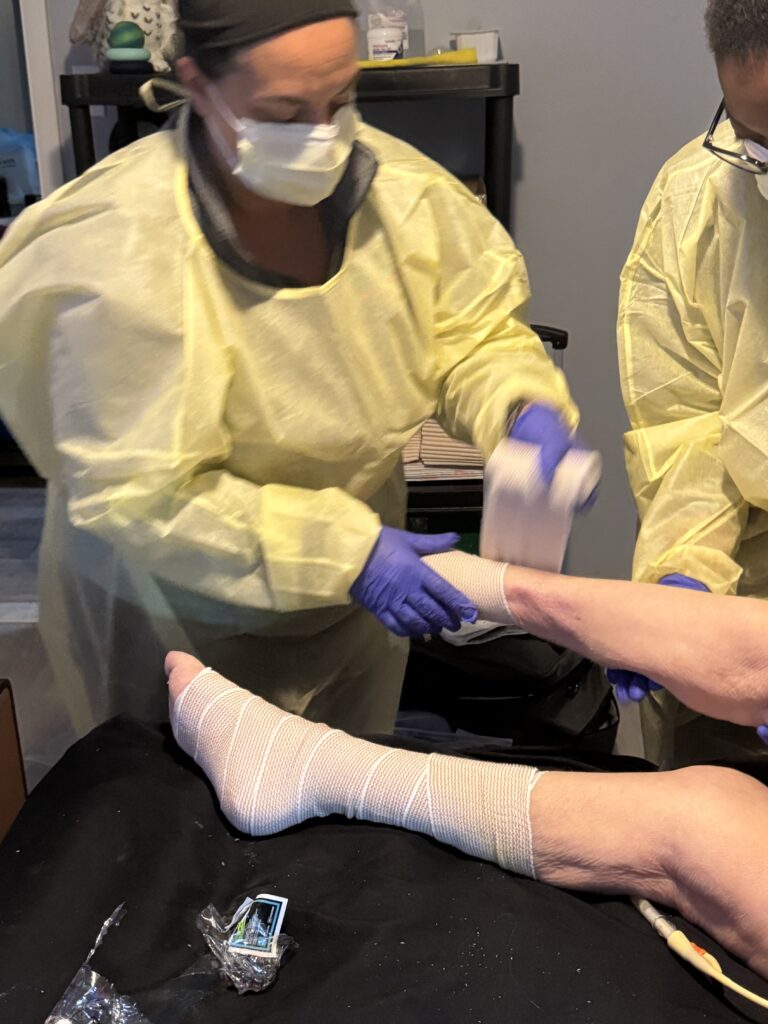Let’s discuss swelling that doesn’t go away. This type of swelling can appear after an injury, surgery, or a long illness, and it can gradually become a part of your daily life. At first, it seems harmless. Over time, though, it starts to change how your clothes fit, how your limbs move, and how your skin feels. Persistent swelling may be more than just fluid retention; it could indicate early-stage lymphedema.
So the real question is: Is this swelling normal? Or is your body signaling for help?
What Is Lymphedema?
Lymphedema is a condition that occurs when too much lymph fluid collects in the soft tissues of your body, usually in the arms or legs. This happens when the lymphatic system, which helps move fluid and filter out toxins, gets damaged or blocked. Lymphedema can develop slowly, so catching it early and getting treatment is crucial to avoid serious issues like limited mobility, frequent infections, or wounds that won’t heal.
5 Early Signs of Lymphedema You Shouldn’t Ignore
- Persistent Swelling in One Limb: If one leg, arm, foot, or hand remains swollen, even after resting, elevating, or using compression, it may be more than just inflammation. Swelling from lymphedema usually doesn’t disappear quickly and may get worse over time.
- Heaviness or Tightness: Many people describe early lymphedema as feeling tight, heavy, or full in the affected area, even before any swelling is visible.
Pro tip: If your arm or leg feels heavier than usual, even if it looks the same, pay attention. This can be an early sign.
- Skin Texture Changes
At the start, your skin might feel:
- Firmer or thicker
- Less elastic
- Slightly shiny or tight
These changes are warning signs of fluid buildup and potential hardening of the tissue.
- Indentation or Pitting: Gently press your thumb into the swollen area. If it leaves a dent that remains for several seconds, that’s called pitting edema, which is a common warning sign for lymphedema.
- Clothing or Jewelry Feeling Tighter: Your rings, watch, socks, or sleeves may suddenly feel tighter, even if your weight hasn’t changed. This often indicates early-stage fluid retention that shouldn’t be ignored.
Watch: How Restore First Health is transforming at-home lymphedema treatment.
Why Early Detection Matters
If lymphedema goes untreated, it can lead to:
- Chronic skin changes
- Frequent infections (like cellulitis)
- Hard-to-treat wounds
- Long-term disability or reduced independence
At Restore First Health, we know that identifying lymphedema early and coordinating expert care can make a significant difference. With our advanced health care providers who come to your home, we develop treatment plans that are effective and sustainable.
Read: What You Need to Know About Cellulitis: Causes, Diagnosis, Prevention, and Support
What to Do If You Suspect Lymphedema
Don’t wait.
Early lymphedema often responds better to therapy, compression, and care planning than later stages.
Here’s what to do:
- Talk to your home health nurse or provider
- Request an evaluation from a wound or lymphedema specialist
- Avoid injury or extreme heat in the affected area
- Properly elevate and support the limb
- Keep the skin clean and moisturized
If you or someone you care for needs specialized mobile care, our team is prepared to help.
How Restore First Health Can Help
We offer lymphedema and wound care right in your home. That includes:
- In-home clinical evaluation and personalized care planning
- Collaboration with home health nurses and family caregivers
- Advanced technology and techniques, not just ace bandages and guesswork
- Preventive strategies to reduce recurrence
- Strong communication with patients and referring providers
Contact us today:
We’ll coordinate the care, so you don’t have to.
- Refer a patient. https://restorefirsthealth.com/refer-a-patient/
- Schedule a consult. https://restorefirsthealth.com/request-a-consultation/
Follow us to keep up to the date on the latest health news:
National Cancer Institute. (2024). Lymphedema (PDQ®)–Health Professional Version. NIH. PMC7140031. Retrieved from https://www.cancer.gov/about-cancer/treatment/side-effects/lymphedema/lymphedema-hp-pdq#_354
